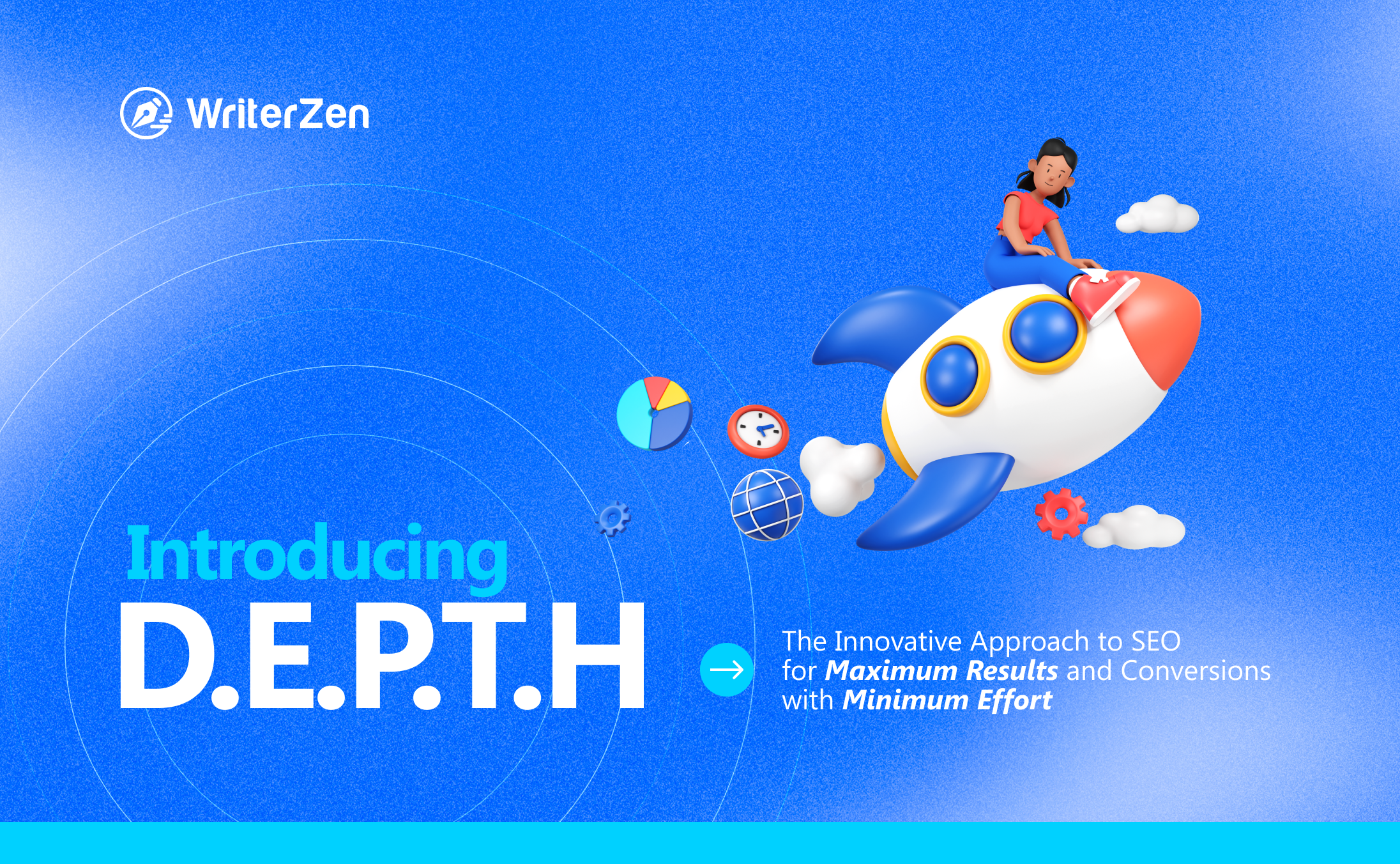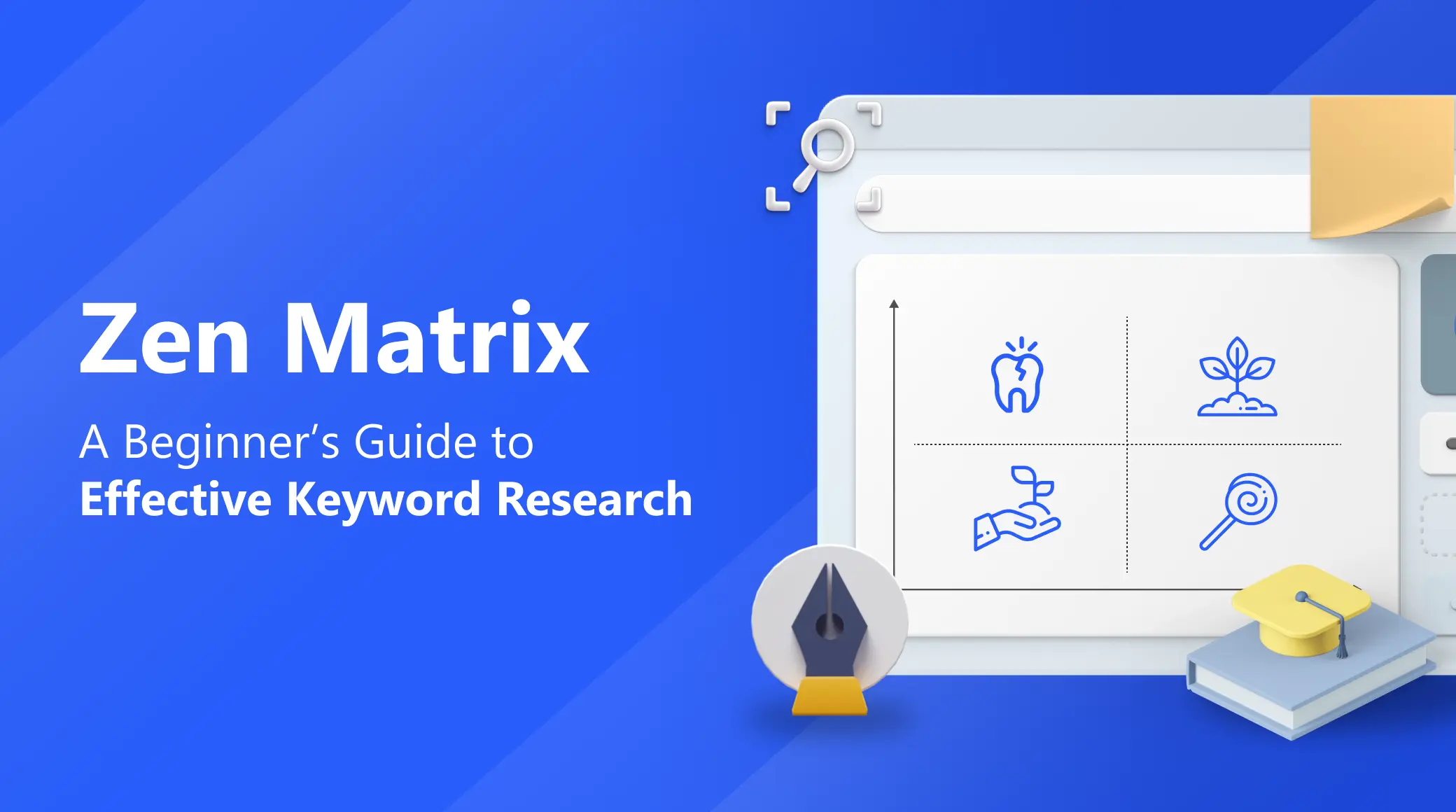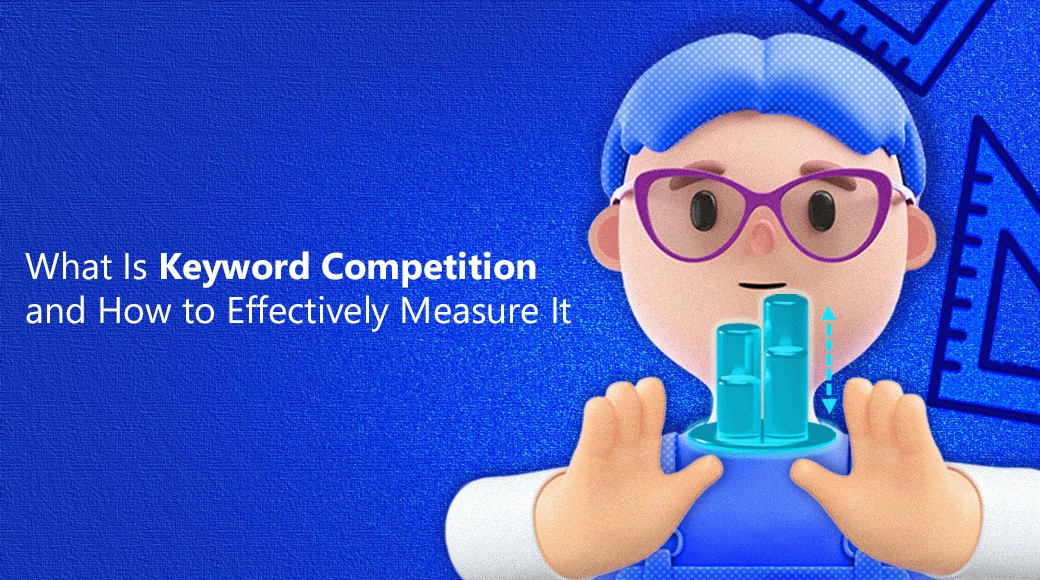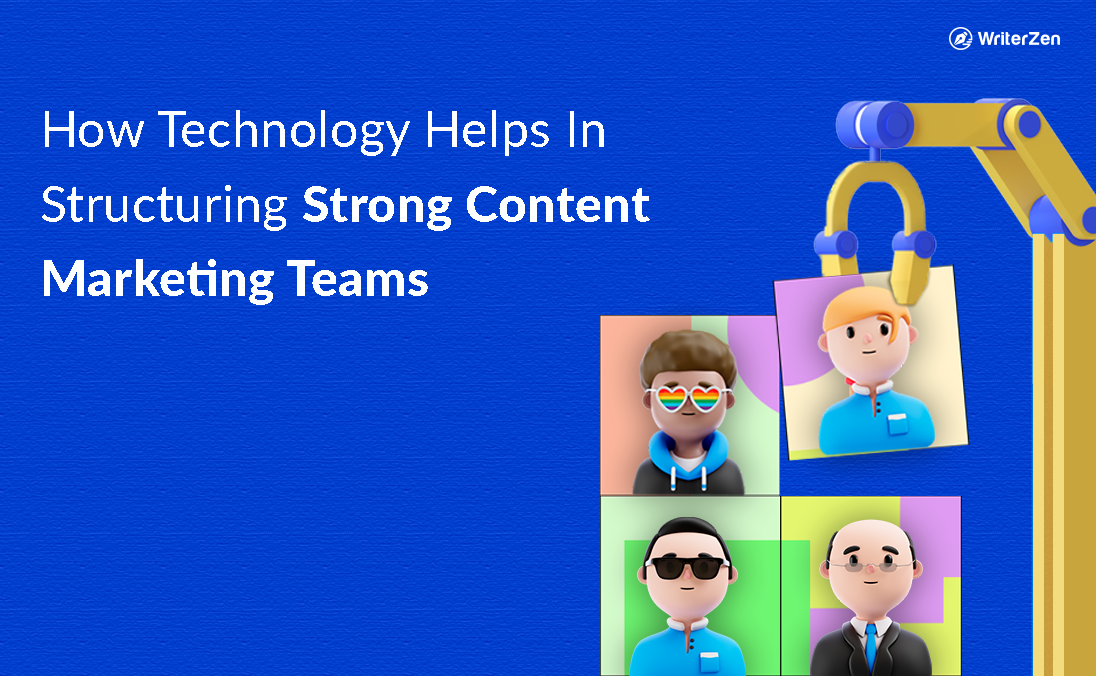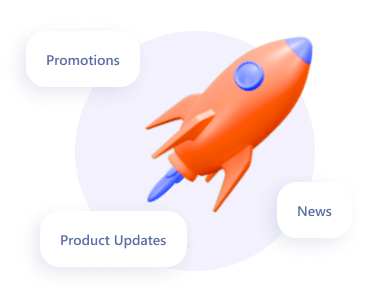In the world of Search Engine Optimization (SEO), getting to the top of search engine rankings is the ultimate goal. To achieve this, we rely on the following workflow:
-
Analyzing keyword data
-
Creating quality content
-
Optimizing on-page factors
-
Building backlinks (depending on the situation)
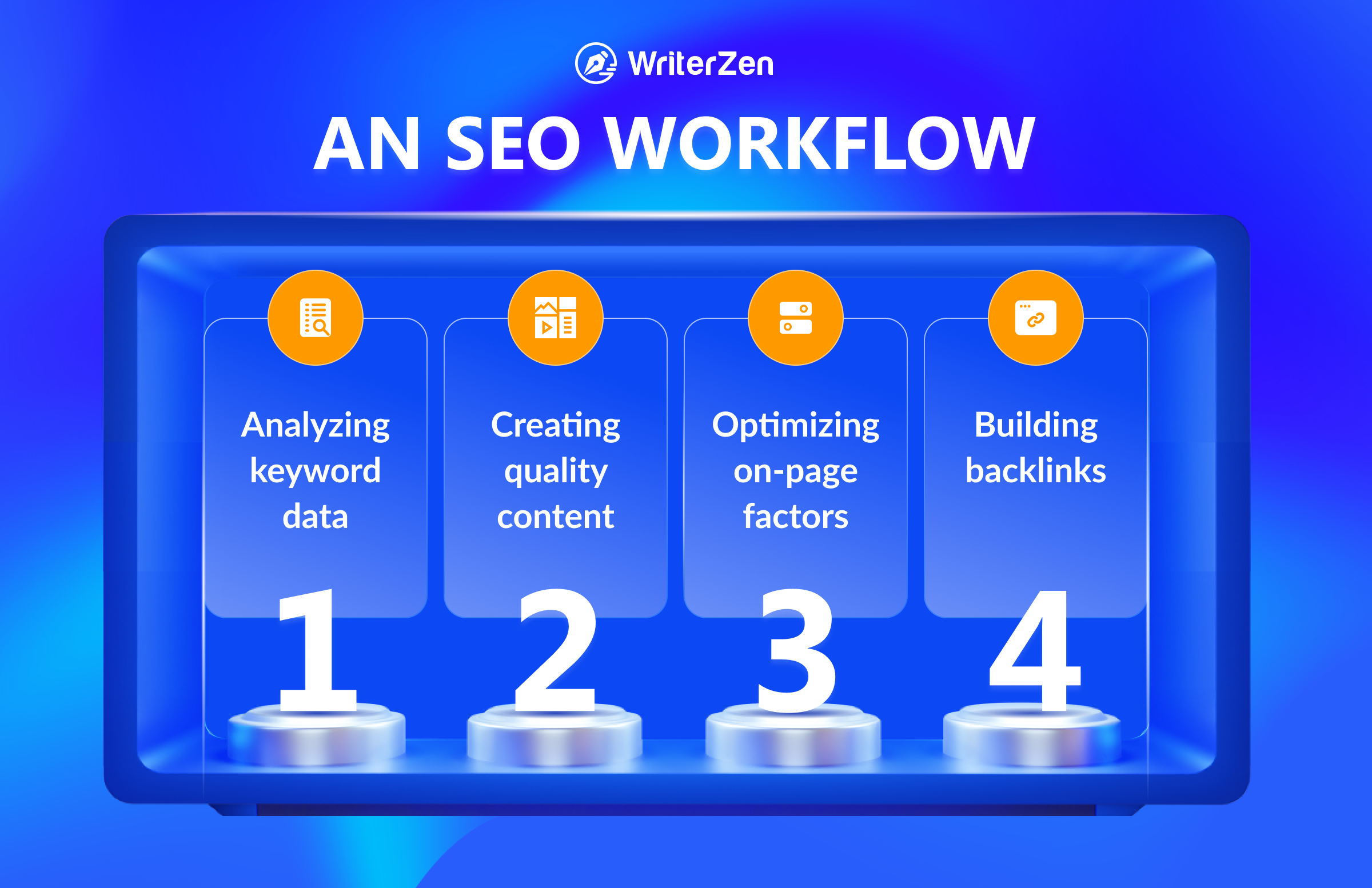
Each stage is important and builds upon the previous. But the foundation of this entire process is the analysis stage.
Getting your keyword research wrong can jeopardize your entire campaign. Worse, it can be a costly mistake in terms of time and resources.
At least, that’s the case when poor research becomes obvious.
But what about when it’s not obvious?
I’m talking about SEO campaigns built on less-than-optimal keyword research. It equates to time and resources, typically dozens of hours creating and optimizing content, and more time and resources promoting that content.
This is the reality many SEOs are in, without knowing it.
Campaigns built on less-than-optimal keyword research require more effort (time and resources) to manage. Additionally, if and when keywords achieve top-of-the-fold rankings, they often bring in less traffic and less conversions than expected.
This is because the keyword research lacked enough depth.
The cause of this problem is twofold:
-
Lack of depth and meaningful data from existing keyword research tools
-
Lack of knowledge to figure out the data that leads to top rankings
The first issue is the real problem for SEOs that are not seasoned pros. Because they trust the data from the keyword tool to be absolute.
Why Keyword Difficulty Scores Don't Tell the Full Story and Often Lead to Poor SEO Campaigns
Keyword Difficulty (KD) scores are a metric used in SEO to measure how difficult it would be to rank on the first page of search engine results pages (SERPs) for a particular keyword.
Just about every decent keyword research tool provides a KD score.
This metric is usually the make-or-break metric for an unseasoned SEO when it comes to deciding whether or not to go after a keyword.
And there lies the problem.
While KD scores can be useful for understanding the general level of competition for a keyword ‘at a glance’, they do have limitations and potential problems:
Lack of Accuracy
KD scores are often calculated based on the number of websites that currently rank for a particular keyword, as well as other factors such as domain authority, backlinks, and content relevance.
However, these metrics may not always be accurate indicators of how difficult it is to rank for a keyword.
For example, a website with a low domain authority might be able to rank well for a keyword if they have high-quality content and relevant backlinks.
Limited Scope
KD scores may not take into account other factors that can affect a website's visibility, such as social media presence, brand recognition, or local search rankings.
Keyword Intent
KD scores don't take into account the intent behind a keyword search. For example, a user searching for "buy shoes" may be more likely to convert into a customer than a user searching for "types of shoes."
However, both keywords may have similar KD scores, even though the intent behind the searches is different.
Aside from the above limitations, keyword difficulty tells you about the competition for a keyword, but it doesn’t tell you about the people searching for that keyword.
Ultimately, the goal of your SEO effort is to put your content in front of the people searching for a given keyword, not the competition.
It’s the searchers you need to understand.
This is the secret behind bullet-proof SEO campaigns.
Uncover the Power of D.E.P.T.H and Achieve Better Rankings
D.E.P.T.H stands for Data Exploration Provides Tactical Highpoints. It is a game-changing approach to SEO that goes beyond traditional methods of data analysis performed by keyword research tools.
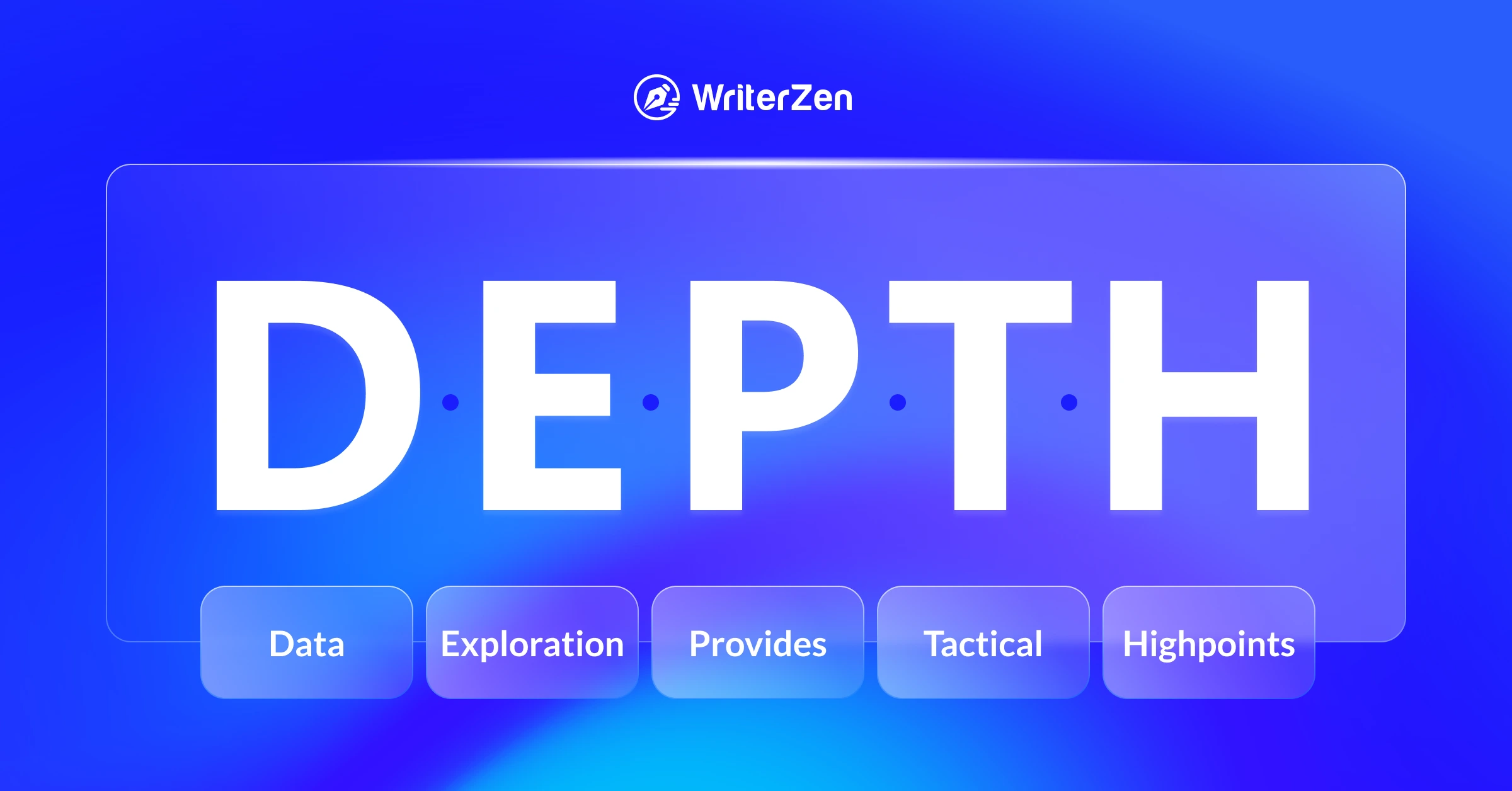
With D.E.P.T.H, you can achieve insights into ranking data that were previously difficult, time-consuming, or even impossible to uncover.
And in case you’re wondering, we came up with the D.E.P.T.H. acronym to encapsulate the meaning of depth in analytical data.
The aim of D.E.P.T.H is to help you achieve better rankings and conversions by providing you with a more complete understanding of keyword data.
By categorizing keyword data into various types of concepts, such as keyword type, searcher intent, the searcher’s stage in the buying journey, and more, you end up with more meaningful data that shape your SEO strategy.
The reality is that seasoned SEOs understand keyword research tools and use them to gather potential keywords to target.
But the real work takes place outside of the keyword tool.
The Secret Sauce of Seasoned SEOs: The Manual Exploration That Separates Novices from Experts
Let’s look at the process of obtaining meaningful data in order to rank. We’ll pretend we want to rank for the term “mattresses”.
The first step is to fire up the keyword tool of your choice and enter your seed keyword to obtain SERP data.
The essential metrics we’re looking for are search volume and competitiveness.
-
Search volume determines whether it’s worth our time targeting the keyword.
-
Competitiveness gives us an indication of how many resources it may take, which can also determine whether it’s viable to target that keyword.
There are many nuances that play a part at this stage, including:
-
Our domain authority
-
Domain authority of competitors
-
Our website’s Topical Authority
-
The Topical Authority of competing pages
-
The age of our site (very new sites can take longer to rank)
-
Etc.
In order to focus on the actual process of obtaining deeper, meaningful data, we’ll ignore the nuances and use only the 2 essential metrics: search volume and competitiveness.
Although assessing competitiveness is a complex process, the Keyword Difficulty score offers a quick solution to bypassing this complexity.
This is where a non-seasoned SEO nears the end of their keyword research. Aside from the nuances I listed above, they’re looking for keywords with enough traffic and a Keyword Difficulty score that they can overcome.
But as I mentioned earlier, this metric lacks context, and this is what leads to less-than-optimal keyword research.
Because context is everything.
At this stage, the seasoned-SEO switches to a browser in order to continue the process of filtering keywords to arrive at the keywords that align with their campaign's goal.
Let’s fast-track through this process and look at the questions that need to be answered.
Seed keyword: mattress
-
Are the SERPs dominated by branded or non-branded keywords?
If your intention is to rank a sales page and the SERPs are dominated by articles, that means Google treats this keyword as an informational query.
-
If branded, what are the brands?
If your intention is to rank brand-specific content, you need to be able to assess the ranking potential of your content. If a competing brand dominates the SERPs for your target keyword, you may want to look for a better keyword.
-
Are the competing pages articles or product pages? If they’re a mix, which is more predominant?
If the SERPs are dominated by informational articles, attempting to rank a sales page in that space is almost a guaranteed failure.
-
What’s the intent of the searcher behind the query? Are they looking to buy something or are they seeking information?
Getting the intent wrong will lead to poor conversions, if you even manage to rank.
-
Where in the buying journey is the searcher? Are they still comparing products or are they ready to purchase?
Misunderstanding where in the buying journey the searcher is can destroy your conversions and, eventually, your rankings as your time-on-page metric deteriorates.
-
What about the micro intent of the searcher? Could this be a post-sales support-type query?
Intent is everything that matters from the searcher’s perspective. If you want to know what type of mattress is best for you and the landing page you’re on showcases one mattress only and pushes you to purchase, you’re simply going to exit.
It should be pretty obvious by now how imperfect the Keyword Difficulty metric is, and uninformed we as SEOs are just by looking at this metric.
A worse-case scenario is finding what seems like a decent keyword with a low Keyword Difficulty score and committing our time and resources to creating, optimizing and publishing content when, in fact, we could be targeting the wrong keyword type, the wrong intent, and the wrong stage of the buying funnel.
How WriterZen’s D.E.P.T.H Integration Puts the Power of Seasoned SEOs into the Hands of Every SEO
Good SEO requires a significant investment of time and effort to be successful. While keyword research tools provide a great starting point, they don't tell the whole story.
The manual work needed to analyze and understand the data is where the real insights lie.
But achieving meaningful, insightful data can be a tedious and time-consuming process. Additionally, it takes a certain level of knowledge and experience to get good at extracting that data.
At WriterZen, we've integrated D.E.P.T.H into our tool. By incorporating D.E.P.T.H, we've streamlined the process of manual data analysis, making it accessible and easy for SEOs of all levels.
D.E.P.T.H, or Data Exploration Provides Tactical Highpoints, is a game-changing approach to SEO that goes beyond traditional methods of data analysis.
You only have to use it once to understand how suboptimal your previous keyword research has been.
With WriterZen, you can now achieve what used to take hours in a matter of moments, with just a few clicks. This allows you to optimize your website more effectively and achieve better rankings and conversions in less time.
This is great news for seasoned SEOs who really appreciate what that saving in time and analysis means.
A Use Case Study: Replicating The Secret Sauce in WriterZen with D.E.P.T.H
Let’s revisit the example use case and see how WriterZen achieves a deeper analysis.
Seed keyword: mattress
In the first step, we entered the seed keyword in Keyword Explorer to obtain SERPs data:
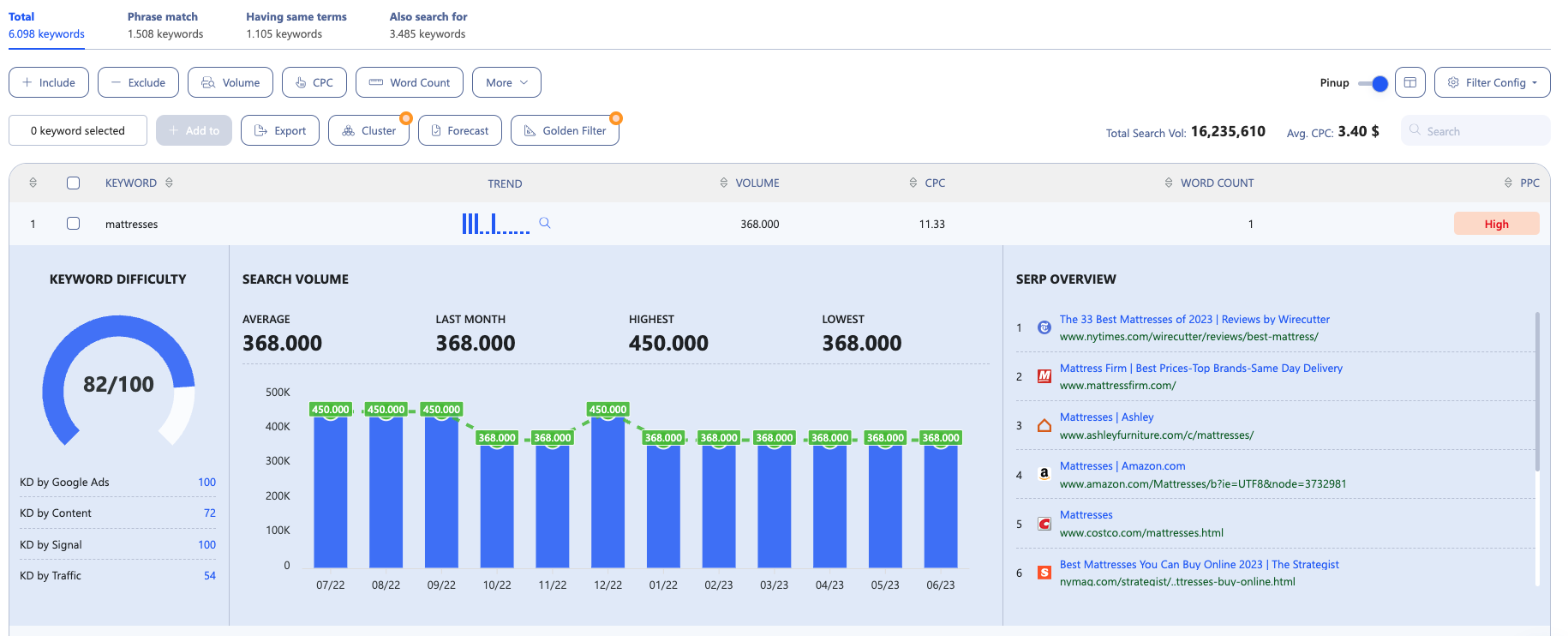
After clustering keywords, we’ll be automatically taken to Keyword Planner, which provides us with Keyword Insights (Keyword Intent, Micro Intent, Buying Journey, and Keyword Types).
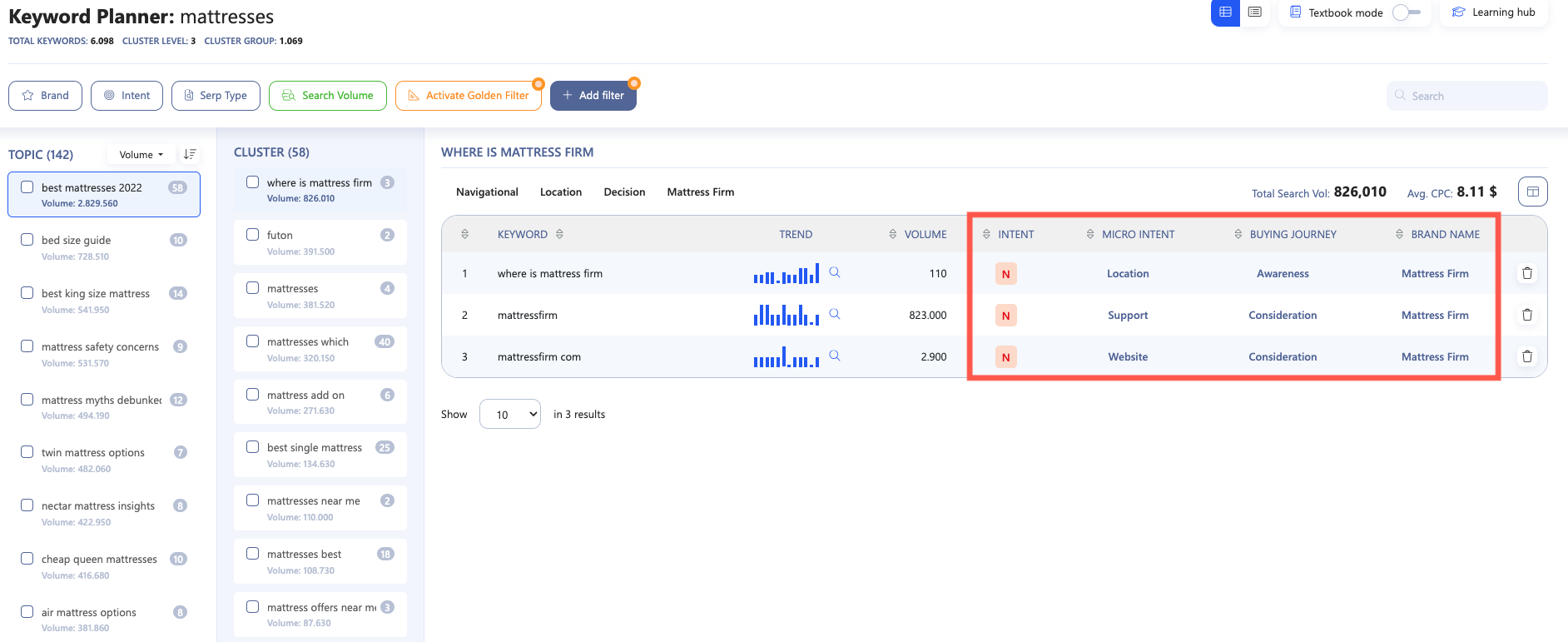
Filtering the Winning Keywords with The Golden Filter
At this point, we have achieved depth of analysis. We have the information we need to understand what keywords we should be targeting.
Now is the right time to implement the Keyword Difficulty scores, don’t you think?
Instead of applying Keyword Difficulty at the beginning of the research process, to a bunch of general search terms, without any context other than search volume and some ranking data, we apply it at the end of the process, to the actual keywords that matter.
This is the point at which we should know what the competitiveness of the keywords in our list is.
We do this with our Golden Filter, which we developed as an advanced version of Doug Cunnington’s Keyword Golden Ratio.
Essentially, Keyword Golden Ratio (KGR) is a manual process that works for keywords up to a certain search volume. We created our Golden Filter in order to apply the KGR concept to any and all keywords algorithmically.
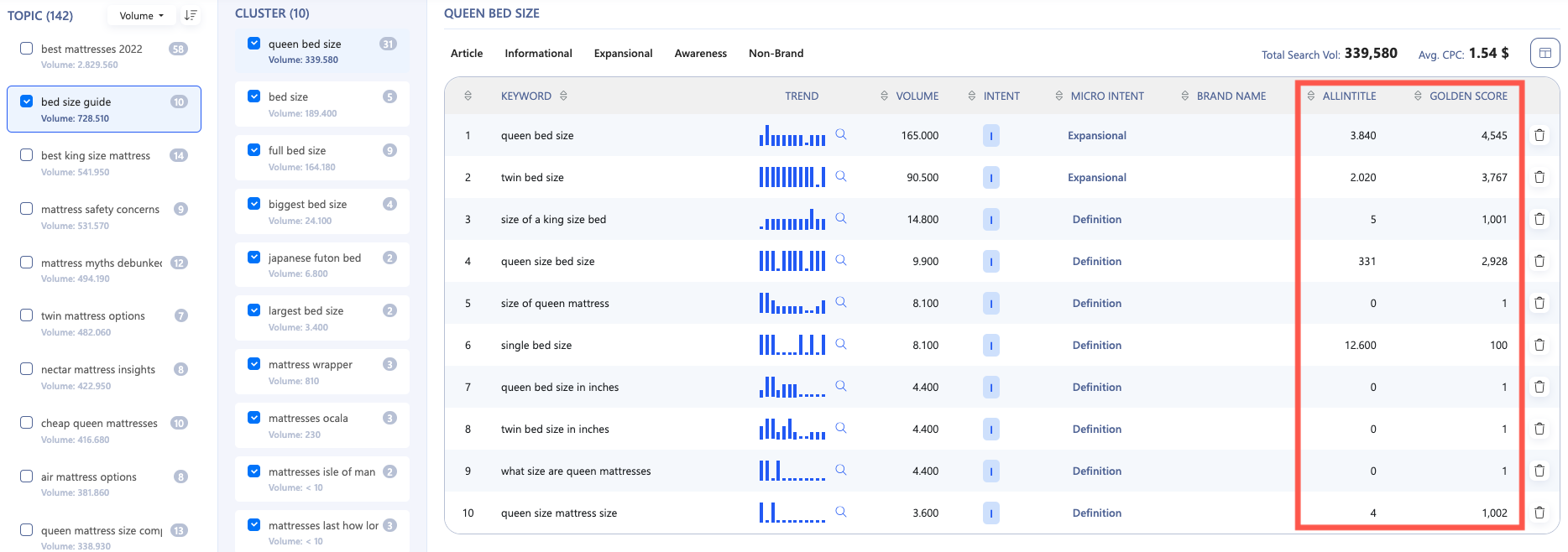
Discarding the more competitive keywords from our list, or saving them for a later stage, enables us to focus on achievable keywords.
AI-Powered SEO Advice: Kill Doubt and Get Clarity at the Click of a Button
At WriterZen, we’re laser-focused on applying artificial intelligence in a meaningful way that actually moves the SEO needle.
We understand that handing over a list of the best keywords to target does not always lead to action. The user’s knowledge gap may actually stop them from moving forward at this point.
We reasoned that, if a user had access to any resource, they would - at this point - ask a mentor or coach how best to proceed.
So we created exactly that.
Our “Suggest Content Brief” button combines the depth of our data and the power of AI to help you achieve clarity at the click of a button, vanishing doubt and procrastination in an instant.
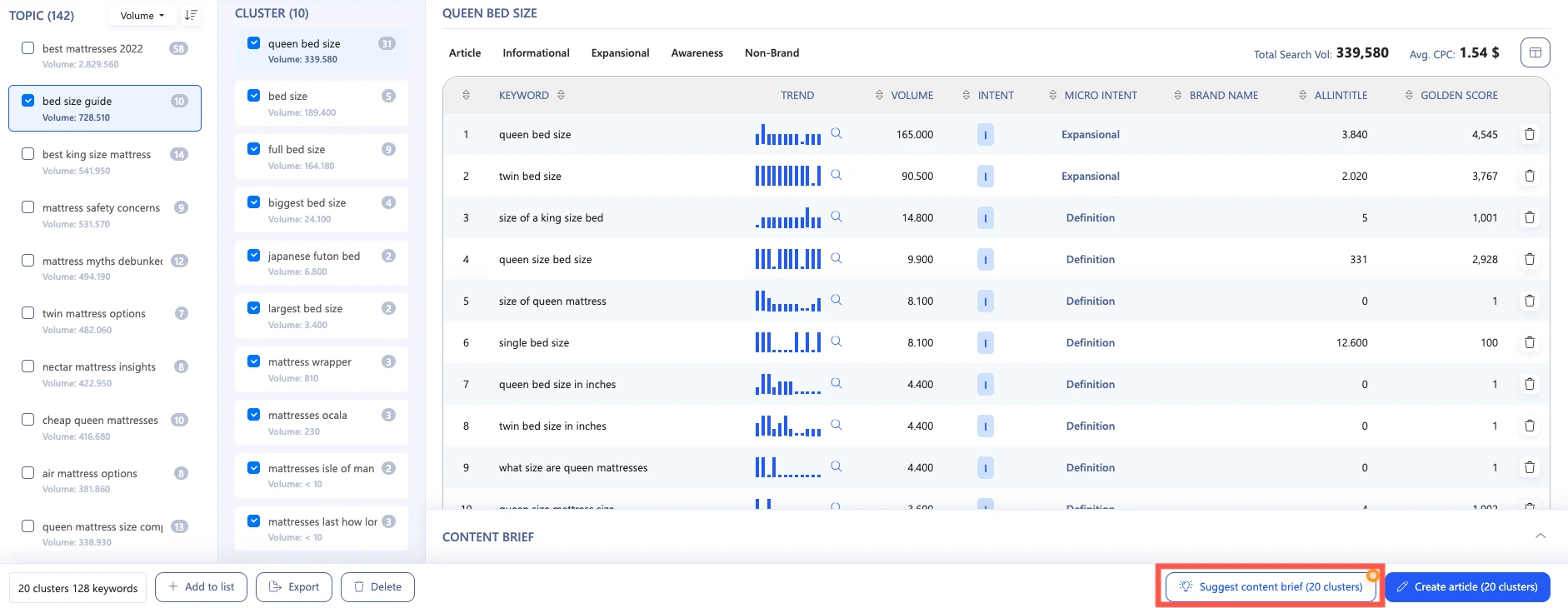
Once you've used WriterZen to find the best keywords to rank for and clustered them, you’ll be automatically taken to our Keyword Planner tool, where you can click the 'Suggest Content Brief' button to get instant clarity on the content angle and format, target audience, author perspective and article tone.

Let's take a closer look at what advice the button provides in our use case example:
-
Content Angle: the content angle gives us a clear direction of the purpose of our article.
In this instance, it’s a guide to finding the best bed shop online or nearby, with a focus on bed mattresses.
The article will provide tips on how to choose the right bed mattress and highlight the benefits of buying from a reputable bed shop. It will also address common concerns and questions that buyers may have when shopping for a bed mattress online or in-store.
-
Target Audience: the target audience for this keyword cluster is ‘Bed mattress buyers’.
-
Author Perspective: the author's perspective is ‘Expert advice’.
-
Content Format: how-to guides.
-
Content Tone: Informative/Explanatory
-
Seed Keyword: highest-volume keyword.
With this information at your fingertips, you can create effective SEO strategies that speak directly to your target audience’s search intent, driving more traffic to your website and increasing conversions.
Creating Killer Content with AI: The Final Piece in the Puzzle
At this point, you’ve clicked your way through the entire keyword research process using our D.E.P.T.H. integration and arrived at the right keywords for your campaign.
You’ve applied The Golden Filter to assess the competitiveness of your keywords and discarded the ones that are not suitable for you at this stage.
You’ve consulted the AI to get valuable insights into your target keyword and remove any doubts you may have still had.
That’s a lot of work achieved in a very short span of time.
The next step is the final piece of stage 1, before publishing: content creation and optimization.
This is by no means a walk in the park either.
Wouldn’t it be a dream if we managed to automate that too?
Well, we did.
Our AI Assistant is one click away.
Here’s the process:
-
Click the Create Article button
-
Your seed keyword is already set. Enable Google NLP if you want to use this feature. You can read about Google NLP here.
-
Enter the keywords to include in your article (your keyword list will be carried across by default)
-
Set whether you want the AI Assistant to generate a title and description
-
Set whether you want the AI Assistant to auto build an outline
-
Set the AI Assistant toggle to generate content
The content type and tone are set by default, but you can manually change both of these to suit your own preference.
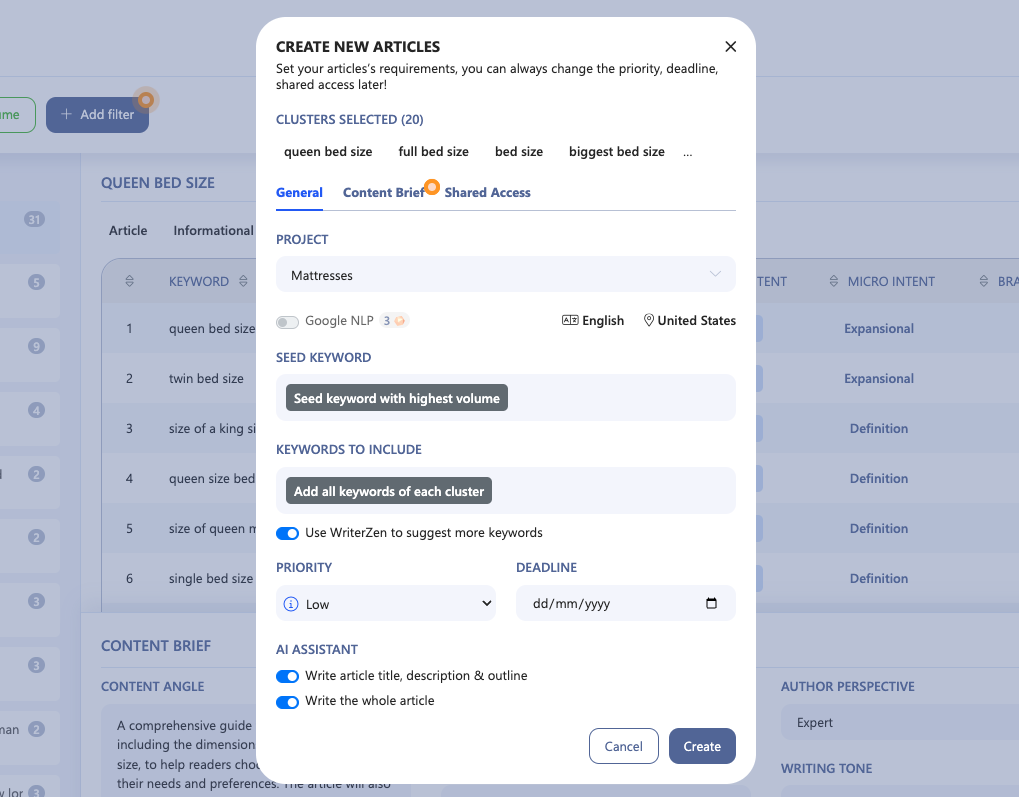
Once you’re ready, click Create and sit back and relax while the AI does the heavy lifting for you.
Once your article is ready, all that remains is for you to read through it and amend as you wish.
Now that you've done creating your SEO content, let's go over how WriterZen integrates D.E.P.T.H and helps enhance your workflow:
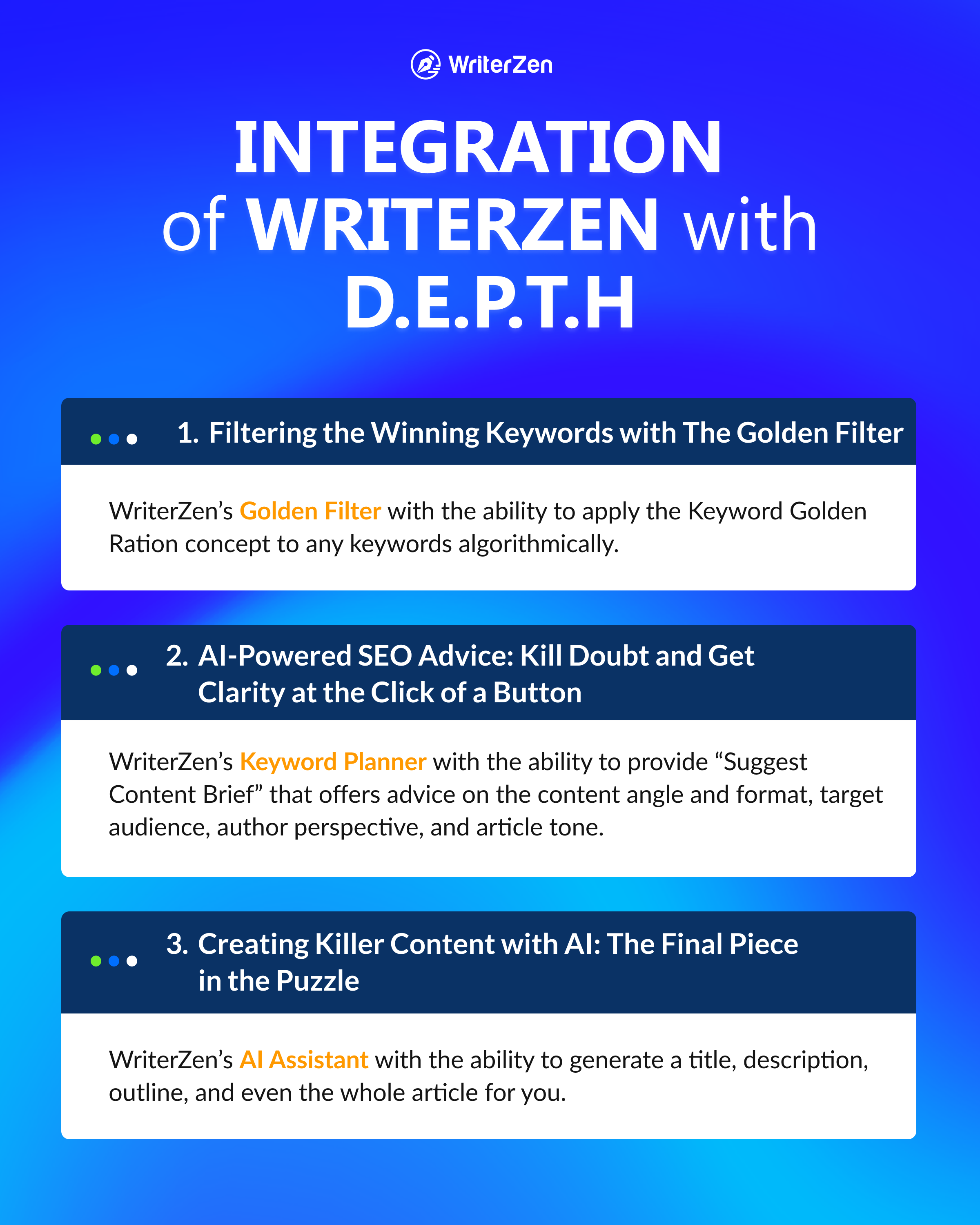
Whether you're a newbie or a seasoned SEO, our tool has everything you need to succeed in today's competitive online landscape. Try WriterZen today and take your SEO game to the next level.


